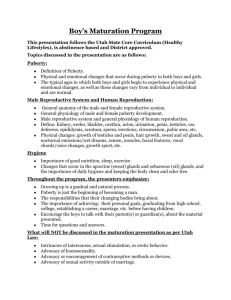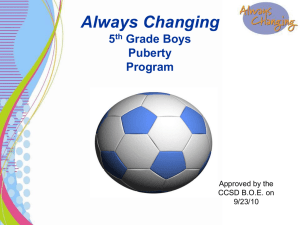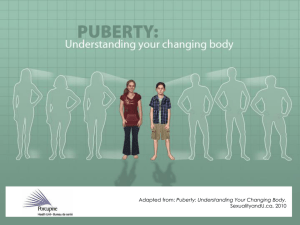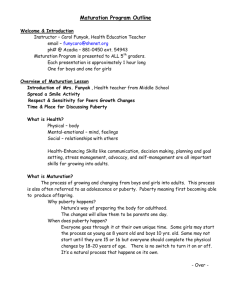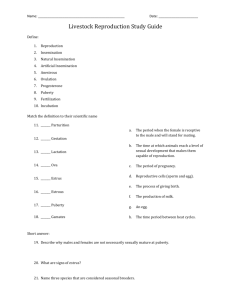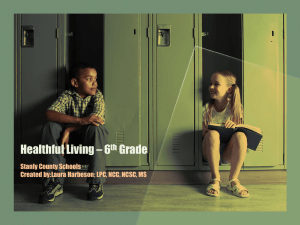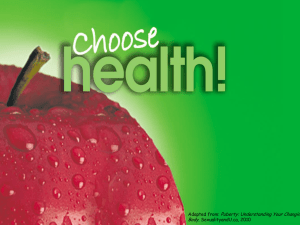Boys and puberty booklet - Public Health
advertisement
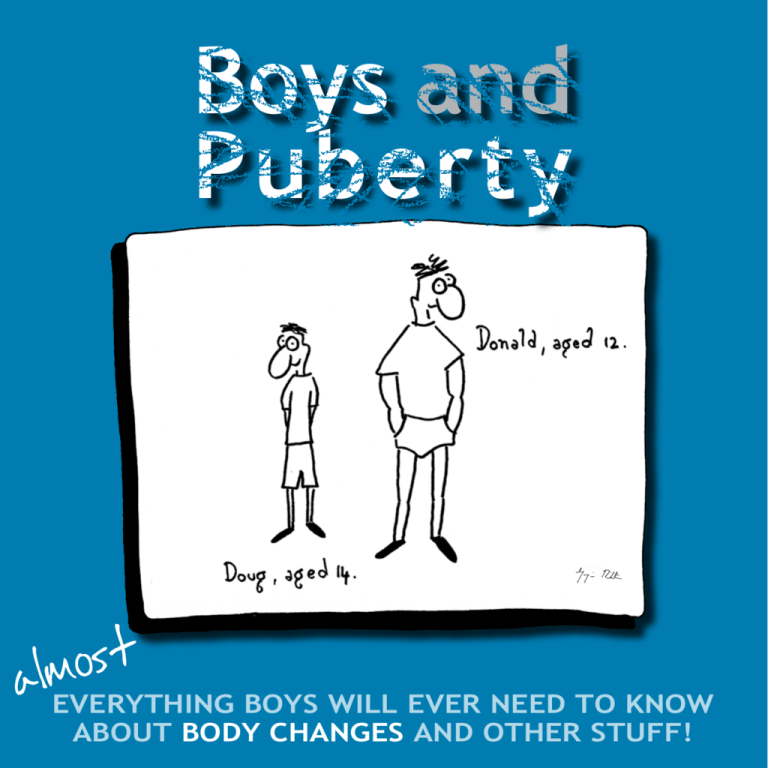
Boys and Puberty Everything boys will ever need to know about body changes and other stuff! In this booklet, we’ve got together a heap of information so that you can be informed about the important stuff. And that will help keep you safe and happy and well. (PS: If you want to know what girls go through, have a look at the Girls and Puberty Booklet.) Do butterflies get homework too? Human beings are complex things. When you’re at school, you’re expected to get your homework handed in on time and go through puberty too. Compared to us, caterpillars have it easy. They spin a cocoon around themselves and then, bingo! A few weeks later, they emerge as butterflies. Or maybe a moth. Whereas kids have to go from being kids to adults and learn about the mysterious ‘facts of life’ on that journey. Your body changes, but you don’t get to stay in a cocoon while it’s happening. Is it just me, or have I arrived on a new planet? When you hit puberty, things change. Boys start to turn into men, and girls start to turn into women. The body changes and the way you look at the world often changes too. Puberty is a gradual thing and everyone goes through it. Puberty happens to you even while you are getting your homework done, swimming at the beach, or going to the movies. Whether you are a boy or a girl, you will experience the physical and emotional changes of adolescence. For boys, puberty can begin around 12 or 13. For girls, it’s between 9 and 11. During puberty, you might compare your body with your friends’ bodies. One friend may have a deeper voice. Another might have hair on his chest or under his arms. Everyone develops at different rates. But by the time everyone grows up, there will hardly be any differences between you. Puberty is a time of many changes. Sometimes when you’re in the middle of it, you might feel there is no one to talk to. Want to know something scary? Parents often understand more than you might think! Remember, they went through puberty too! If you don’t want to talk to your parents, you could try talking to a trusted relative or friend. Saying things out loud can be a good way of getting things clear in your mind. 1 So you know all about the lifecycle of a butterfly? And you know why it’s important to look after your body? Most of this puberty stuff you have probably already picked up from somewhere – books, movies, the school nurse, the Net, your mates, but do you know the whole story? In the following pages, you will find useful information and advice about what happens to your body during puberty. Things that change l Voice (gets squeaky, then deeper) see page 4 l Body hair (armpits, chest, around penis, shaving) see page 4 l l Your genitals (testicles, penis) see page 6 Sexuality (erections, wet dreams) see page 8 l Breasts see page 9 Looking after yourself l Eat right and exercise see page 10 l Acne and pimples see page 11 l Sweat see page 11 Conclusion l Further Information see page 12 Are there things you have ever wondered about... but haven’t dared to ask? 2 3 Things that change During puberty, your testicles (testes or balls) start producing the male hormone testosterone. This hormone triggers the changes in your body. Suddenly you will grow taller and begin to develop muscles. You will also find physical changes happening to your voice, your body hair and your genitals, and possibly even your breasts. Voice During puberty your Adam’s apple (larynx) gets bigger and your voice begins to ‘break’. Your vocal cords grow quickly. As it is breaking, your voice will sometimes go squeaky when you are talking, but once it has finished breaking, you will have the deeper voice of a man. When should I shave? Body hair Hair will start to grow under your arms and around the pubic area. This hair will be fine and straight at first, and will become thicker and curlier as you get older. You may also find more hair growing on your legs and arms. Hair will also appear on your chin and upper lip. 4 Hair that will appear on your face will be fine and downy at first but become more bristly as you grow older. You will probably not need to shave much at first: this will become more regular in your later teenage years. The time when you begin to shave is a matter of choice. You might like to talk your decision over with a parent or a trusted adult before you begin. You may also like some shaving lessons from someone who has done it before! Remember to avoid sharing razors with other people. 5 Your genitals (sex organs) One area of our bodies that we tend to focus much of our attention on is our genitals ­– heavens knows why?! ­– and penises certainly can develop during puberty. It is important to remember that these changes are gradual. The tallest 12 year old will not always turn out to be the tallest 21 year old, and the same is true with penises. You may find that after you have finished developing, your penis is not as big as those of some other boys. There is no cause for worry: a small penis fulfils its purpose just as effectively as a larger one. A tour of the genitals The testes: During puberty, there is a change in your testicles (testes). Along with the male hormone testosterone, the testicles begin to produce sperm. Sperm are tadpoleshaped and their ‘tails’ help them move. Sperm are so tiny that they can only be seen under a microscope. The testicles need to be kept cool for the sperm to develop normally. This is why they hang outside the body in a sac (bag) called the scrotum. It is quite normal for one testicle (testis) to be larger or to hang lower than the other. At birth, some boys may have experienced what is called ‘undescended testicles’ where one or both testicles fail to move down into the scrotum. This is usually corrected after birth. However, even testicles that did move down into the scrotum will sometimes pull back into the body, for instance in cold water, or during sex. This is quite normal. They will eventually move back into place on their own. Any concerns you have about differences in the testicles can be talked over with a doctor. Why should I check my testicles? The penis: How do I look after my foreskin? The foreskin is a fold of skin which covers the tip of the penis (glans). It is very important to keep the area beneath it clean. The foreskin should be pushed back daily and the glans gently washed. Sometimes the foreskin is removed surgically at birth. This operation is known as circumcision. Doctors rarely recommend circumcision, but it is performed by some groups as part of their cultural and religious beliefs. In your father’s and grandfathers’ generations, most boys in Australia were circumcised. Now only about 10% of boys born in Australia are circumcised each year. Sometimes older boys are circumcised for medical reasons, but this is not common. Once you have reached puberty, it is a good idea to regularly check the size and shape of your testicles. A good time to do this is in the shower. The purpose of this check is to get to know the size, shape and texture of your testicles. It is perfectly normal for one of your testicles to be bigger than the other. But if you notice any changes in your testicles, especially a lump, you must see a doctor. One of the most common cancers for men between the ages of 15 and 30 years is cancer of the testes. VAS DEFERENS BLADDER SEMINAL VESICLE RECTUM PENIS PROSTATE GLAND URETHRA EPIDIDYMIS ANUS TESTIS SCROTUM FORESKIN LEG 6 7 Sexuality Why does my penis go hard? Penises vary in size and appearance. There is a large natural variation in the sizes of adult penises, but when they are erect, they are mostly a similar size. When the penis is stimulated or a boy or a man is sexually aroused, the penis can grow from being small, limp and soft to larger, erect and hard. This is called an erection. The penis does not contain any bones and is not made of muscle. The penis becomes erect because the tissue inside the penis fills with blood under pressure. A thick whitish fluid is also produced by the seminal vesicle and the prostate gland. This mixes with the sperm to form semen. At the peak of sexual excitement - when a male ‘reaches climax’, ‘comes’ or has an orgasm - semen is pumped out of the end of the erect penis. This is called ejaculation. The milky fluid or ejaculate (come, cum) contains 200 to 500 million sperm. During sexual excitement, but before orgasm or ejaculation, a small amount of clear fluid may be released from the penis. This clear fluid is called pre-cum. This fluid also carries live, active sperm. 8 What happens to my urine when I ejaculate? Semen passes from the testicles through the epididymis and vas deferens before being ejaculated through the urethra the same tube that urine passes through. But it is impossible for urine and semen to become mixed because the flow of urine is automatically stopped when your penis is erect. What is a wet dream? During puberty, you can become sexually excited or aroused quite easily. Ejaculations can happen while you are asleep. These are called nocturnal emissions, or “wet dreams”. Wet dreams are totally normal. They are your body’s way of getting rid of a build up of semen in your body. When you wake after a wet dream, your sheets or pyjamas may feel slightly sticky. Sometimes you remember the good feeling in the night, or you may remember nothing at all. Breasts About one-third of boys will experience some sort of minor breast development during puberty. This is normal and is usually nothing to worry about. You may notice swelling or lumps under your nipples. Your nipples may also feel tender when clothing rubs against them. Wearing Bandaids might help with this. The swelling usually lasts around four to six months, but it may continue for longer. See a doctor if this is worrying you. Looking After Yourself Eat right and exercise With all these monumental changes in your body, it is important to look after yourself well. Treat your body as you would treat the family pet! If you give your body the fuel it needs to grow, and if you give it regular exercise, you will be giving yourself the best chance to feel good about yourself. Good food and exercise. Sounds simple, doesn’t it? And it is. What’s good? 10 What’s not? •A well-balanced diet. Include lots of fresh fruit and vegies and plenty of water. •Fatty foods. Fried foods. Sugary foods (pastries, biscuits, chips, lollies). •Exercise! If you don’t enjoy sport, try hitting the dance floor (or the lounge room) with friends. Choose something active that you enjoy - that way you’ll keep doing it. •Stay away from crash diets. They don’t work. •Being a couch potato. Acne and pimples How can I look after my skin? In puberty your body is a hormone-producing machine. The production of new hormones also affects your sebaceous (oilproducing) glands and your sweat glands. Frequent, gentle washing with warm water and a mild soap or face wash can help. Dirt doesn’t cause acne but washing can get rid of excess sebum. You may also find that certain foods make your pimples worse. Cut down on these. Eat lots of fresh fruit and vegies and drink plenty of water. If your skin is really bothering you, then see your doctor. Pimples are caused by overactivity of the sebaceous glands. These glands lie just under the skin. They produce sebum - the natural oil that keeps your skin supple. During puberty, your hormones make the sebaceous glands grow bigger and produce extra sebum. This sebum is often thicker and flows more slowly, so it tends to clog the pores, causing pimples. When pimples become very inflamed, this condition is called acne. Some teenagers are troubled by pimples and acne for several years. There is no single treatment to suit everybody. Sweat Once you have reached puberty, you may also find that you sweat more. Remember that sweating is a normal human function. The healthiest of sports people may lose buckets of sweat out on the sports field! By itself, sweat does not have much of a smell but bacteria which live on the skin can create a smell called body odour or BO. To avoid body odour, wash your body at least once a day, especially the underarm area, using mild soap and warm water. Change and wash your clothes often, including your socks. It helps to wear lose fitting clothing, made from natural fibres. An underarm deodorant may be useful, too. Worrying about body odour is one of the many things that people get needlessly anxious about. If you bathe and wash your clothes regularly, it is very unlikely you will have a problem. 11 Conclusion Puberty is a time of many changes, both physical and emotional. Some of these changes are exciting, others are daunting. Don’t forget that there are adults around you who can help you through the tricky times. When you emerge at the other end, you will be well on the way to becoming an adult. Original cartoons by Georgia Richter If you want some useful information and advice about sex, love and relationships, look out for the book of ‘Relationships, sex and other stuff’ available from good school nurses everywhere! 12 Further information If you have any sort of problem you want to talk about confidentially with a trained counsellor Kids Help Line - (24 hours) - 1800 55 1800 A great site with lots of answers for 10 to 12 year olds, especially about puberty The Hormone Factory www.thehormonefactory.com For information about sexual health and contraception Sexual Health Helpline - (08) 9227 6178. Country callers - 1800 198 205 www.fpwa.org.au If you have been sexually abused or assaulted Sexual Assault Resource Centre (24 hours) (08) 9340 1828. Country callers - 1800 199 888 © Department of Health, 2007 HP10368 JULY’07 22139 A good site for teenagers Queensland Health Youth Site www.health.qld.gov.au/istaysafe For general health information HealthInfo - 1300 135 030 Free pamphlets and information www.population.health.wa.gov.au/ordering/
